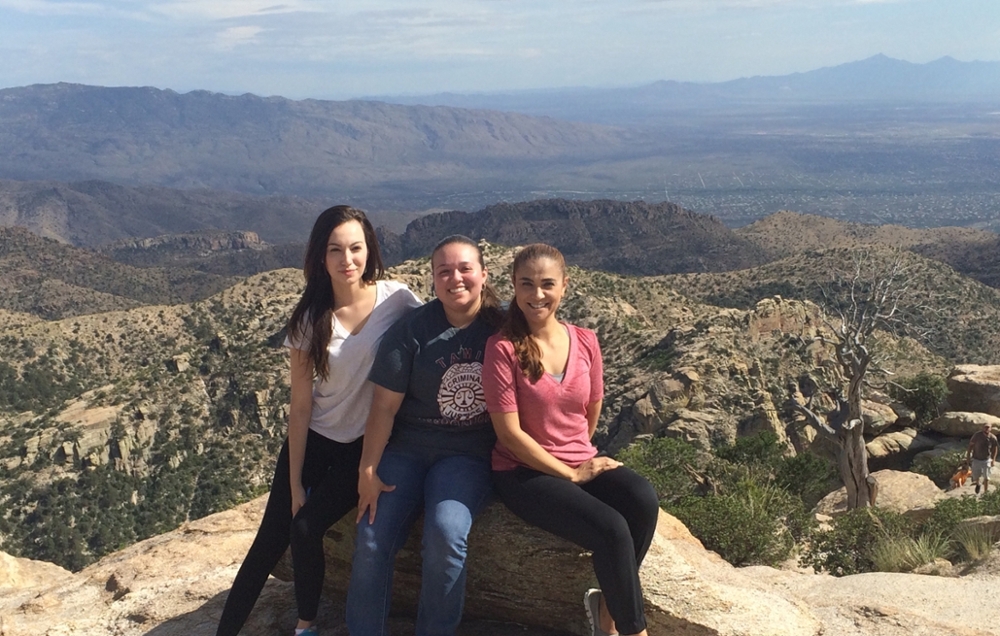TAMIU Professor, Graduate Students Help Advance Tools to ID Human Trafficking Victims

The work to create a tool to help identify the most vulnerable victims of domestic human trafficking is being developed by a Texas A&M International University (TAMIU) associate professor and two research assistants.
Dr. Claudia San Miguel, chair, TAMIU College of Arts and Sciences (COAS) Department of Social Sciences, led a summer research program in Arizona to develop a screening tool to identify victims of human trafficking, especially LGBTQ minors.
Dr. San Miguel, Lorena Zapata (TAMIU, ’14), graduate student, History and Political Thought, and Kristina E. Morales (TAMIU, ’13), graduate student, Criminal Justice, spent 10 weeks conducting research to create the diagnostic tool to help identify domestic human trafficking victims.
Educating all stakeholders and partners on the peculiarities of human trafficking is a high priority. While there are several tools available, few include domestic and minor trafficking victims, especially LGBTQ minors,” said San Miguel.
It is difficult to identify individuals affected by this crime, so our research project focused mainly on LBGTQ homeless youth,” added Zapata.
According to studies, the most vulnerable victims of domestic human trafficking are runaway and homeless children, and minors who are part of the LGBTQ community are some of the most vulnerable victims.
Within 48 hours after running away, one in three homeless youth, including the LGBTQ youth population, will be recruited by a trafficker and will become victims of sex trafficking. Thus, it’s of utmost importance that screening tools be mindful of these issues,” said Morales.
“I didn’t know the extent that human trafficking goes unattended because it is an underground crime. Most victims are often overseen for many reasons. That was shocking,” said Zapata.
Domestic human trafficking cases are those where victims are transported within the boundaries of the U.S. without ever crossing an international border. This makes a second-line of defense incredibly significant to victim identification and rescue.
“This research complements Department of Homeland Security’s Blue Campaign by incorporating a holistic approach and adding additional layers of defense to ultimately identify and rescue victims of human trafficking in the United States. It further complements the Trafficking Victims Protection Act because the research is victim-centered and focused on helping to rescue victims of human trafficking,” explained San Miguel.
“We need to shift efforts toward service providers and other stakeholders in the education profession, foster care system and other agencies who often come in contact with runaway and homeless children. Our first-line of defense against this crime is to better educate and train them to identify domestic human trafficking victims,” San Miguel added.
The project’s goal complemented research at the University of Arizona and the National Center for Border Security and Immigration (BORDERS).
This is the second year San Miguel participated in the project.
Initially, the research assistants did not completely understand the difficulty in identifying human trafficking victims.
“This research experience has strengthened my determination at better understanding the complexities of human trafficking in order to better identify and rescue victims of this crime. Because I plan on entering a law enforcement profession after graduation and as a result of this experience, I will now be better prepared for a career in law enforcement and I will be mindful for victims, especially victims of human trafficking,” said Morales.
They not only learned about the plight of human trafficking victims, they also learned valuable communication, research, presentation and teamwork skills.
“My favorite part of the program was learning something about a topic I was not familiar with and disseminating important information to individuals who do not know about the topic,” said Zapata.
“I understand why it is so difficult for the victims to speak up for themselves. They are often afraid of being arrested if they go to the authorities because some are here illegally. I also strongly believe that this research project will help to educate people in the United States about the existence of human trafficking in our own country and, in that way, help to prevent it,” added Zapata.
San Miguel’s role was not limited to researcher either. Her role as a mentor and professor helped Zapata and Morales enrich and enhance their skills.
“The impact of the summer research experience on my academic planning is consistent with my role as a professor—which is to provide impactful research experiences to students to help them achieve their academic and professional goals.
“The experience changed both students. They gained a deeper appreciation of the societal issues that drive human trafficking and they also found the research experience to be enriching. Both received invaluable advice about career paths and I believe the experience will help them solidify future career goals,” said San Miguel.
In addition to learning about a new subject and new skills, it was also the first time both research assistants lived in a different city from their respective families.
“I would recommend this program to others because it gave me the experience of gaining knowledge and the opportunity to navigate a new city. I had never lived alone and it was a great experience,” said Morales.
Zapata agreed.
“I not only learned about a new topic, I also had the opportunity to present our research on the topic. Plus I was able to explore Tucson, Ariz., a place I had never visited before. The experience was challenging, but it was also exciting and enlightening,” said Zapata.
“I enjoyed watching the students grow as individuals and gaining self-confidence. Neither had lived away from their families, nor had they lived in another city. It was interesting to see them navigate these aspects of the program,” said San Miguel.
San Miguel also said she plans to host an annual Human Trafficking Conference, a documentary day for students and community members and continue efforts for an anti-trafficking group which will include local community and University stakeholders.
Morales said she has plans to enter law enforcement after completing her master’s degree.
Zapata said she will apply to law school after graduation.
A Laredo native, San Miguel received her bachelor’s and master’s in science degrees in Criminal Justice from TAMIU and her Ph.D. in Criminal Justice from Sam Houston State University.
For more information, contact San Miguel at csanmiguel@tamiu.edu or call 956.326.2529.
University office hours are 8 a.m. – 5 p.m., Monday – Friday.
Additional information is also available @txamiu on Facebook, Twitter, YouTube and on the free TAMIU mobile phone and tablet application at www.tamiu.edu
